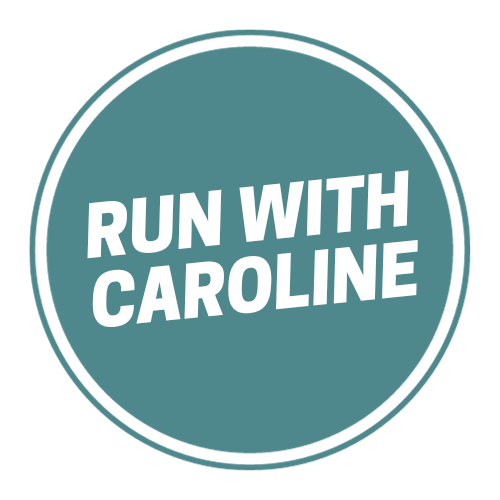For many runners, carb loading is done the week before a long-distance run or race.
Carb loading for runners is a well-known race strategy to help you perform better on race day.
You may have heard of the term ‘carb loading’ in the running community.
For many long distance runners, it’s a rite of passage before a half marathon or marathon.
But what exactly is carb loading? What are you supposed to eat and when during the carb loading period? And more importantly how do you know if you’re doing it properly?
In this guide we’ll explore:
- What is carb loading?
- Why is carb loading for runners important?
- How to carb load
- 3 carb loading strategies
- What are the best foods to eat when carb loading?
- What foods should you avoid when carb loading?
- Sample carb loading plan for breakfast, lunch and dinner
- Carb loading for runners: 7 carb loading mistakes to avoid
Ready?
Let’s get started!
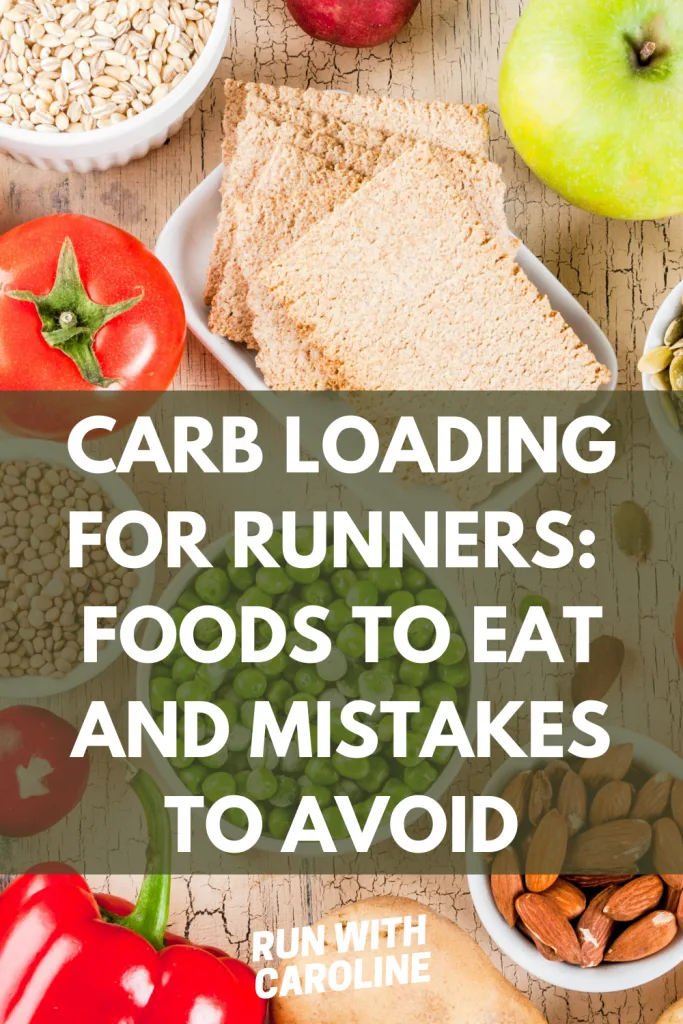
What is carb loading?
Simply put, carb loading (also known as carbohydrate loading) is a nutritional strategy used by endurance athletes in the days leading up to a race or event.
The act of carb loading involves several days of eating carb-rich meals, whilst minimising the amount of aerobic activity to reduce the amount of carbs you are using.
Carbohydrates are a very important fuel source for your body.
The idea is that you increase the amount of carbohydrate stores (also known as glycogen stores) in your body so that you can utilise these on race day.
Related: The best protein foods for runners
Why is carb loading for runners important?
Carb loading is important because it helps to reduce fatigue and improve performance when performing endurance activities like running or cycling.
If your carbohydrate stores are low, you will struggle to muster enough energy.
Hence why it’s important to build them up ahead of race day.
According to a 1997 study, high carbohydrate diets have been reported to improve performance by 2 to 3%.
Citing that in endurance events lasting more than 90 minutes, elevated glycogen content will postpone fatigue by approximately 20%.
Whilst carb loading is recommended for endurance activities lasting 90 minutes or more, there are limited benefits for shorter durations of exercise or short bursts of activity like weight training.
Related: 6 smoothie recipes for runners
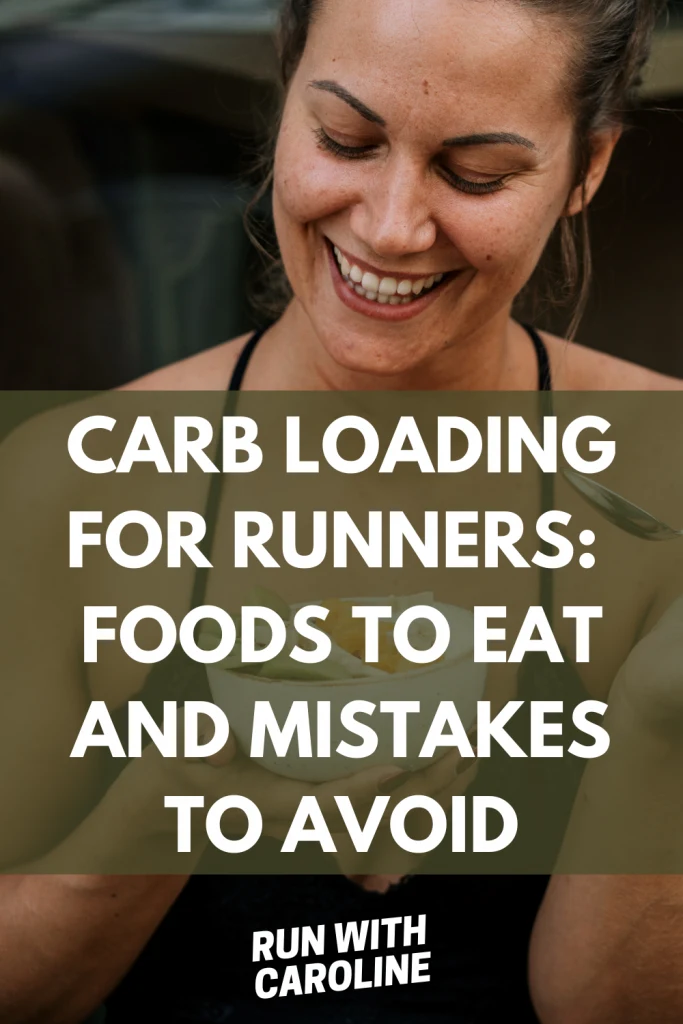
How to carb load
You may be wondering to how to carb load before a half marathon, how to carb load before a marathon, or simply when to carb load before a long run.
There are various methods for carb loading before race day, but essentially all these methods involve you consuming a higher level of carbs in order to increase your glycogen stores.
The foods you eat during this time should be:
- High carb
- Low fat
- Low fibre
Carb loading should always be done in the days leading up to a race or event.
If you are competing in a long distance event like a half marathon or marathon, then carb load for between 2 to 7 days ahead of the event depending on your preferences.
Related: What to eat before running in the morning
3 carb loading strategies
Here are a few sample carb loading strategies to follow ranging from 1 to 6 days:
1 day carb load
- Consume a high carb diet so you get about 70% of your calories from carbs.
- Do not exercise for one day.
3 day carb load
- Days 1 to 3: Consume a high carb diet so you get about 70% of your calories from carbs.
- Throughout these 3 days, perform no exercise.
6 day carb load
- Days 1 to 3: Consume a moderate carb diet so you get about 50% of your calories from carbs.
- Days 4 to 6: Consume a high carb diet so you get about 70% of your calories from carbs.
- Throughout these 6 days, gradually decrease the amount of running. On days 4 to 6, for example, you should be doing as little exercise as possible, roughly 0-20 minutes per day.
Related: The ultimate running race day checklist
What are the best foods to eat when carb loading?
During the carb loading period you should focus on getting most of your calories from carbohydrates.
As mentioned previously, the best foods for carb loading are those that are rich in carbohydrates and low in fat and fibre.
Whilst foods high in fibre are not bad for you, it’s wise to limit the amount of fibre in your diet during the carb loading period because foods high in fibre are harder to digest.
You may be wondering what carbs are best for runners? Here are some good foods that are high in carbs:
- White or brown pasta
- White or brown bread
- White rice
- Porridge oats
- Unsweetened, low-fibre cereal
- Unsweetened granola
- White potatoes (without skins)
- Sweet potatoes (without skins)
- Sweetcorn
- Butternut squash
- Fruit
- Some fruit juices
- Sports drinks
- Beans and legumes
- Low fat milk
- Low fat yoghurt
Related: Taste blood when running? 7 causes + ways to prevent it
What foods should you avoid when carb loading?
Stay away from foods high in refined carbohydrates as these will cause a temporary spike in your glucose levels and will leave you hungrier and more prone to snacking.
Foods high in refined carbohydrates include:
- Cakes
- Biscuits
- Sweets
- Pastries
- Fizzy drinks
- Sweetened breakfast cereals
- Sweetened cereal bars
- Sweetened energy bars
Whilst the occasional treat is fine, you don’t want your main source of carbohydrates to be refined carbs.
Related: Does running burn belly fat? 10 effective tips to lose belly fat
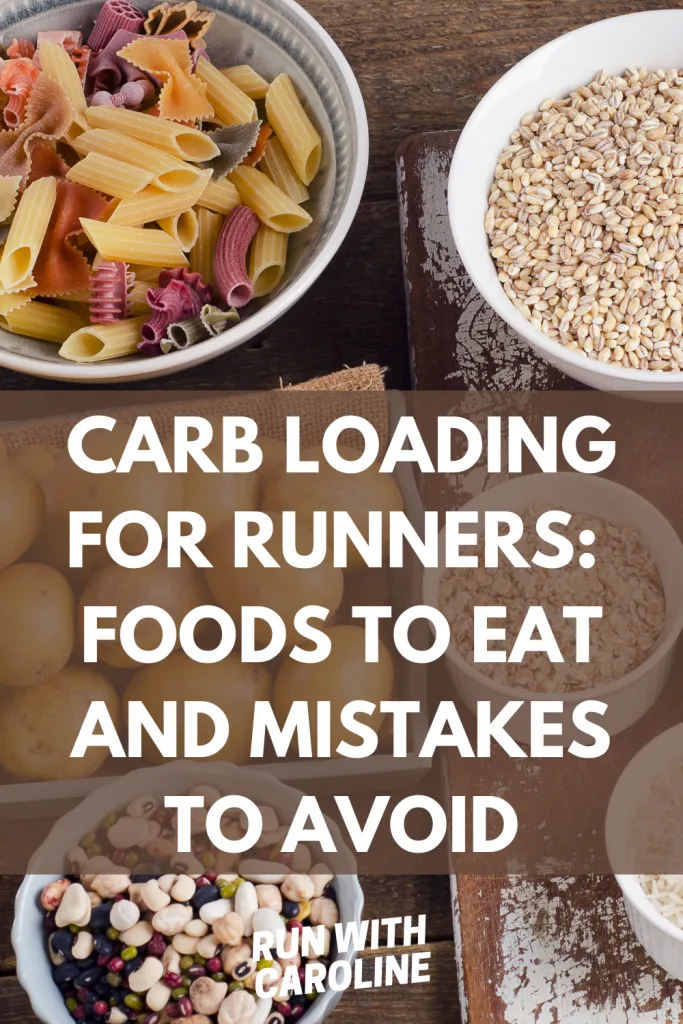
Sample carb loading meal plan
Now you know the best foods and foods to avoid when carb loading, here’s how you put it all together in a sample meal plan.
The meal plan is split into breakfast, lunch and dinner with mid-morning and mid-afternoon snacks.
Breakfast (between 06:00-10:00)
- A small bowl of porridge with milk of your choice, topped with 1 tbsp of nut butter (I like Pip & Nut’s almond butter)
- 1 banana
- 1 cup of orange juice
Mid-morning snack (between 10:00-12:00)
- 2 Nakd bars (flavour of your choice – I like the cocoa orange flavour)
Lunch (between 12:00-14:00)
- A sandwich made with wholegrain bread (filling of your choice)
- 6 carrot sticks dipped in houmous
- 1 apple
- 1 glass of chocolate milk
Mid-afternoon snack (between 14:00-17:00)
- Small jacket potato with baked beans
- 1 square of dark chocolate
Dinner (between 17:00-20:00)
- Tofu cooked with white rice and a side of veggies
- 1 sports drink
Related: The ultimate 12 week beginner half marathon training plan
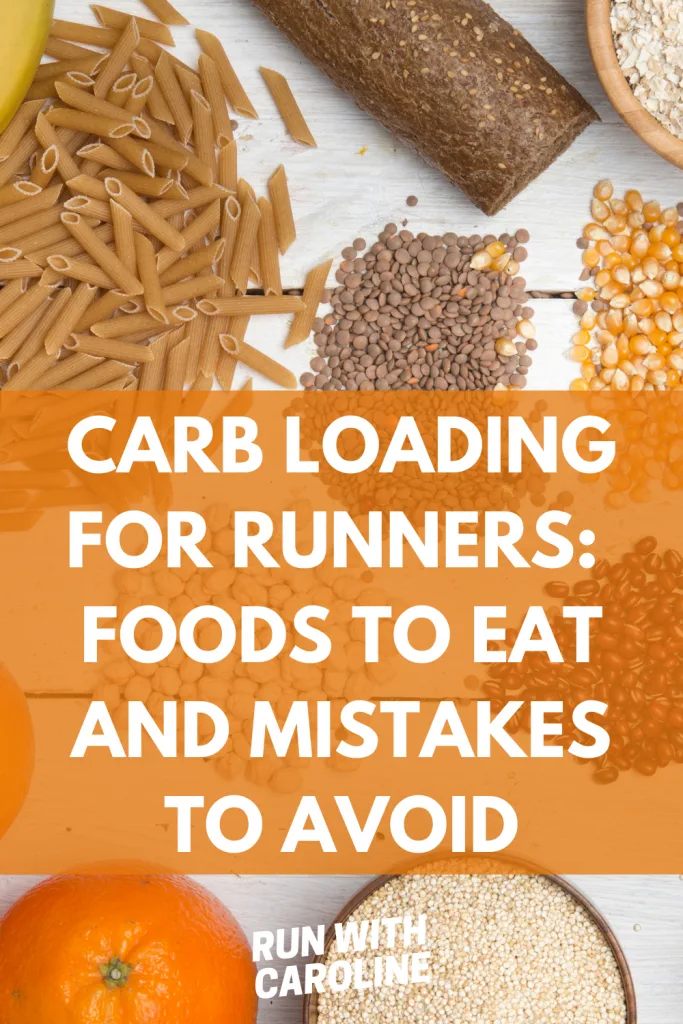
Carb loading for runners: 7 carb loading mistakes to avoid
Carb loading for runners can be minefield of information, so here are the top 7 carb loading mistakes to avoid as a runner:
- Carb loading when you don’t need to
- Eating the wrong amount of carbs
- Eating the wrong types of carbs
- Eating too much fat
- Eating too much fibre
- Exercising too much
- Eating unfamiliar foods
#1 Carb loading when you don’t need to
The general rule of thumb is that carb loading should be performed for endurance activities lasting 90 minutes or longer.
So if you’re a runner, think half marathon, marathon and ultra-marathon distances.
You do not need to carb load for activities lasting under 90 minutes, or for short bursts of activity such as weight training or HIIT.
#2 Eating the wrong amount of carbs
For your daily intake of carbs, experts recommend you eat between 8 to 10 grams of carbohydrates per kilogram of body weight.
For example, if you weigh 70kg, then you will need to eat between 560 and 700 grams of carbs per day.
The best way to track the amount of carbs you are eating on a daily basis is through a food tracking app like MyFitnessPal.
#3 Eating the wrong types of carbs
As discussed earlier, it is recommended you avoid refined carbohydrates – in other words foods that contain high levels of sugar such as biscuits, sweets and pastries.
#4 Eating too much fat
In the process of loading up on carbs, it’s all too tempting to consume foods that are high in both carbs and fats, such as desserts, buttery breads, pastries and ice cream.
Increasing your carb intake doesn’t mean you need to increase your fat intake.
In fact, eating too much fat could cause weight gain or leave you feeling sluggish ahead of race day.
Opt for high carb foods that are low in fat to avoid consuming too much fat.
#5 Eating too much fibre
Whilst foods high in fibre have their own nutritional benefits, it’s wise to limit the amount of high fibre foods before race day as they are harder to digest.
The last thing you want on race day is your stomach rumbling away whilst it tries to break down food.
#6 Exercising too much
You may have heard of the term ‘tapering’ in the running community.
Tapering refers to the process of reducing exercise in the days leading up to a race or event.
Your training plan should hopefully include a tapering period in the last week. Aim to reduce the amount of exercise you do in the days leading up to the event.
This will benefit your body, giving it that much-needed period of rest ahead of race day.
It will also mean you’re not burning all the calories that you have accumulated during the carb loading period.
#7 Eating unfamiliar foods
Race day is already a nerve-wracking moment, you don’t want to have to contend with an upset stomach as well.
Opt for familiar, tried and tested foods that you know your stomach will be able to cope with.
More food and nutrition tips:
- The best protein foods for runners
- Hydration and running performance: 4 key hydration tips for runners
- 5 things I wish I’d known before returning to running - March 3, 2024
- Running 20 minutes a day: Benefits + how to start - January 27, 2024
- How to run your first 2 hour half marathon - January 16, 2024
